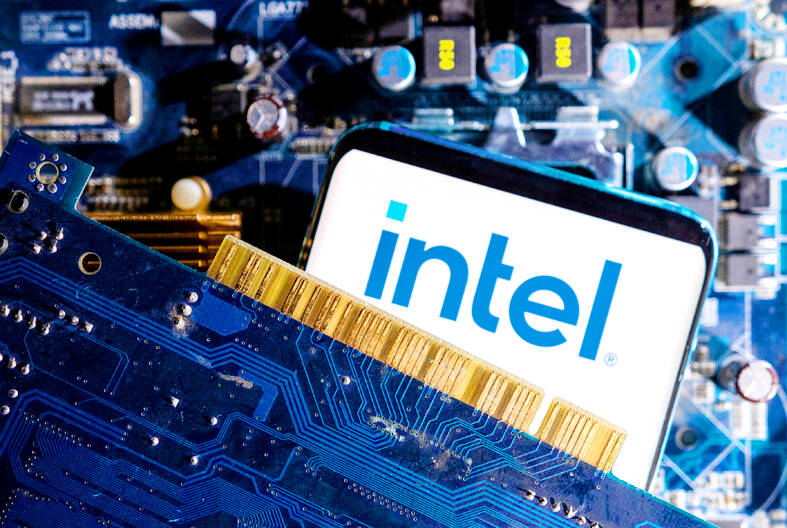Intel Corp on Thursday reported a fourth-quarter loss but better-than-expected revenue as the US chip giant continues to struggle to stake its place in the artificial intelligence (AI) revolution.
The company posted a net loss of US$126 million for the December quarter, compared with a profit of US$2.67 billion in the same period last year. Revenue declined 7 percent to US$14.3 billion, which was slightly better than expected by analysts. The company’s share price rose 2 percent in after-hours trading following the earnings release.
“While Intel’s revenue decline remains concerning, the overall results came in ahead of the most pessimistic forecasts, possibly propped by broader market and geopolitical factors,” Emarketer analyst Jacob Bourne said.

Photo: Reuters
For the full year, Intel recorded a substantial net loss of US$18.8 billion, compared to a profit of US$1.7 billion in 2023, largely due to restructuring charges and challenging market conditions.
Intel chief executive officer Pat Gelsinger was forced out last month after the board lost confidence in his plans to turn the company around.
His abrupt departure came after the company in August last year vowed to cut more than 15,000 jobs in a draconian cost reduction plan, and paused or delayed construction on several chipmaking facilities.
Intel’s shares fell 60 percent last year, and its market valuation is about US$90 billion, just a fraction of Nvidia Corp, which makes the premium graphics processing units (GPUs) that are fueling the AI boom.
Despite the losses, interim co-CEO Michelle Johnston Holthaus highlighted positive developments.
“The fourth quarter was a positive step forward as we delivered revenue, gross margin and EPS above our guidance,” Holthaus said.
She told analysts during an earnings call that Intel could find opportunities to capitalize on buzz generated this week by Chinese start-up DeepSeek (深度求索), with its powerful new chatbot developed at a fraction of the cost of its US competitors.
“Because if we’ve seen anything this week, when there are constraints put on customers, they figure out different ways to deploy technology,” Holthaus said when asked about DeepSeek.
Intel has chips and other assets it can “leverage” to win over customers looking to power AI without having to resort to premium Nvidia GPUs, Holthaus said.
“That’s a great opportunity, and something that I’m looking at to see if there are ways that we can be disruptive there,” Holthaus said.
The company’s Client Computing Group, which includes PC chips, saw revenue fall 9 percent to US$8 billion in the fourth quarter. However, Intel reported strong momentum in AI components for PCs, saying it is on track to ship more than 100 million AI PCs by the end of this year.
Intel has been engaged with the new administration of US President Donald Trump and “feels good” about the effort to promote chipmaking in the US, co-chief executive David Zinsner said. “This is a very positive sign, obviously, for us.”
The earnings report came as Intel continues its search for a permanent CEO.

In Italy’s storied gold-making hubs, jewelers are reworking their designs to trim gold content as they race to blunt the effect of record prices and appeal to shoppers watching their budgets. Gold prices hit a record high on Thursday, surging near US$5,600 an ounce, more than double a year ago as geopolitical concerns and jitters over trade pushed investors toward the safe-haven asset. The rally is putting undue pressure on small artisans as they face mounting demands from customers, including international brands, to produce cheaper items, from signature pieces to wedding rings, according to interviews with four independent jewelers in Italy’s main

Japanese Prime Minister Sanae Takaichi has talked up the benefits of a weaker yen in a campaign speech, adopting a tone at odds with her finance ministry, which has refused to rule out any options to counter excessive foreign exchange volatility. Takaichi later softened her stance, saying she did not have a preference for the yen’s direction. “People say the weak yen is bad right now, but for export industries, it’s a major opportunity,” Takaichi said on Saturday at a rally for Liberal Democratic Party candidate Daishiro Yamagiwa in Kanagawa Prefecture ahead of a snap election on Sunday. “Whether it’s selling food or

CONCERNS: Tech companies investing in AI businesses that purchase their products have raised questions among investors that they are artificially propping up demand Nvidia Corp chief executive officer Jensen Huang (黃仁勳) on Saturday said that the company would be participating in OpenAI’s latest funding round, describing it as potentially “the largest investment we’ve ever made.” “We will invest a great deal of money,” Huang told reporters while visiting Taipei. “I believe in OpenAI. The work that they do is incredible. They’re one of the most consequential companies of our time.” Huang did not say exactly how much Nvidia might contribute, but described the investment as “huge.” “Let Sam announce how much he’s going to raise — it’s for him to decide,” Huang said, referring to OpenAI

The global server market is expected to grow 12.8 percent annually this year, with artificial intelligence (AI) servers projected to account for 16.5 percent, driven by continued investment in AI infrastructure by major cloud service providers (CSPs), market researcher TrendForce Corp (集邦科技) said yesterday. Global AI server shipments this year are expected to increase 28 percent year-on-year to more than 2.7 million units, driven by sustained demand from CSPs and government sovereign cloud projects, TrendForce analyst Frank Kung (龔明德) told the Taipei Times. Demand for GPU-based AI servers, including Nvidia Corp’s GB and Vera Rubin rack systems, is expected to remain high,